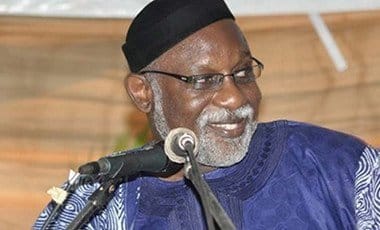A human rights lawyer, Femi Emmanuel-Emodamori, has dragged the Ondo State governor, Mr Rotimi Akeredolu to court over the continued stay in office of the state’s Acting Chief Judge, Justice Temitayo Osoba.
Emadomori had earlier petitioned Akeredolu, Nigerian Bar Association and National Judicial Council (NJC), threatening to approach court of the governor failed to either approve the appointment of Osoba as the substantive Chief Judge or appoint a new judge for the state.
However, Emadomori on Friday, approached court, praying the Ondo State High Court sitting in Akure, the state capital, seeking the removal of Justice Osoba and querying her continued stay in office as the Acting Chief Judge of Ondo State.
The human right lawyer specifically noted that the continued stay in office of Justice Osoba violated the provision of section 271(5) of the 1999 constitution.
According to the lawyer, who listed Justice Temitayo Osoba, Governor Akeredolu of Ondo State, and the Ondo State House of Assembly as the first, second and third defendants respectively in the suit, pointed out that the continued stay in office of Osoba contradicts the provision of law of land.
He explained that Justice Temitayo Osoba cannot continue in office as the Acting Chief Judge of Ondo State beyond the period of three months without a formal extension of such period by Governor Rotimi Akeredolu, saying this should be based on the express recommendation of the National Judicial Council (NJC).
He however called on the court for the interpretation of section 271 (4) and (5) of the 1999 Constitution, and asking the court to remove Justice Osoba, claiming she had used more than the recommended period stipulates by the constitution of the country.
He said “the Constitution of the Federal Republic of Nigeria, 1999 (as amended), says an extension of the three months within which the 1st Defendant can act as the Chief Judge of Ondo State should not have been made before the lapse or expiration of the three months and not afterwards.
“Whether, based on the combined provisions of Sections 271 (1), (4) & (5) of the Constitution of the Federal Republic of Nigeria, 1999 (as amended), the second Defendant is not constitutionally prohibited from re-appointing the first Defendant either as the acting or substantive Chief Judge of Ondo State after the lapse of three months following the assumption of office by the 1st Defendant as the acting Chief Judge without being duly appointed and confirmed as the substantive Chief Judge by the 2nd & 3rd Defendants respectively.”
Mr Emodamori lawsuit further seeks a declaration that, based on the provisions of Section 271(5) of the 1999 Constitution, an extension of the three months within which Justice Osoba can perform the functions of the Acting Chief Judge of Ondo State ought to have been made before the expiration of the three-month period and not afterwards.
He however pointed out “that by the combined provisions of Sections 271 (1), (4) & (5) of the Constitution of the Federal Republic of Nigeria, 1999 (as amended), the 2nd Defendant is constitutionally prohibited from re-appointing the 1st Defendant either as the acting or substantive Chief Judge of Ondo State after the lapse of three months following the assumption of office by the 1st Defendant as the Acting Chief Judge without being duly appointed and confirmed as the substantive Chief Judge by the 2nd & 3rd Defendants respectively.”
He also sought from the court a ruling that “the 3rd Defendant cannot consider or approve the appointment of the 1st Defendant either as the acting or substantive Chief Judge of Ondo State after the lapse or expiration of three months following the assumption of office by the 1st Defendant as the acting Chief Judge without such requisite appointment and confirmation.”
He also urged the court to determine that, “based on the express provision of Sections 271 (5) of the Constitution of the Federal Republic of Nigeria, 1999 (as amended), the 1st Defendant is under obligation to vacate the office of the Acting Chief Judge of Ondo State following the expiration of three months of her assumption of office in that capacity without confirmation or due re-appointment.”
The plaintiff wants the court to rule that, going by the 1999 Constitution, Governor Akeredolu and the Ondo State House of Assembly are constitutionally obliged to remove Justice Osoba from office of the acting Chief Judge of Ondo State upon expiration of three months of her assumption of office in the absence of due reappointment following the judge’s refusal to voluntarily quit the office.
In addition to petitioning the High Court to restrain Justice Osoba from acting as the Chief Judge of Ondo State, Mr Emodamori also wants the court to restrain Governor Akeredolu from re-appointing Justice Osoba either as acting or substantive Chief Judge of Ondo State.
Mr. Emodamori had earlier issued a seven day ultimatum to Governor Akeredolu in a petition which was also addressee to NJC, calling for the removal of Justice Osoba as the state’s CJ.
Recall that Justice Osoba was sworn in as acting Chief Judge by former governor Olusegun Mimiko, on Monday, January 23, 2017.










